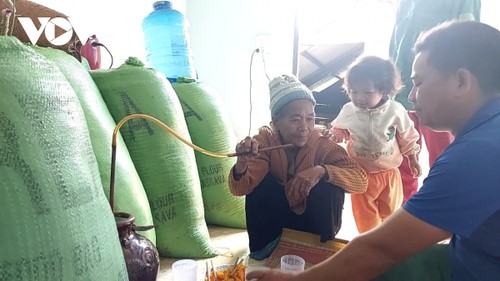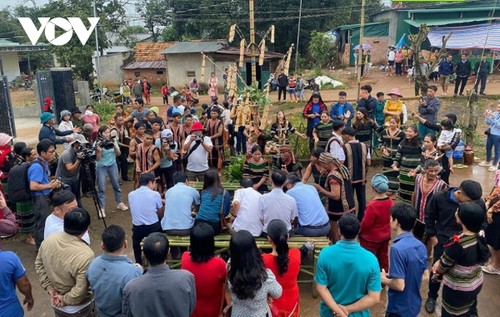 H’Krong, a Mnong woman in Nam Nung commune, Krong No district, drinks wine after the new rice worship ritual. (photo: VOV) H’Krong, a Mnong woman in Nam Nung commune, Krong No district, drinks wine after the new rice worship ritual. (photo: VOV) |
H’Krong, a Mnong woman who lives in Nam Nung commune, Krong No district, is holding a crop blessing ritual in her kitchen, which is full of rice and coffee sacks. The offering includes a pot of wine, a boiled chicken, and a tray of home-grown fruits and vegetables.
H’Krong says that last year her family harvested 40 sacks of rice and 2 tons of green coffee. Blessing the new rice is an important ritual in Mnong culture to ensure a better life.
“We honor the soul of the rice after stockpiling the rice in our kitchen. Now we have coffee. After the harvest, we bring all the farm tools home and welcome the Rice God home. We pray for the health of the family, for better business next year, and for higher rice and coffee productivity,” H’Krong said.
New rice and health rituals are held both by the family and by the community with gong performances and folk songs. The Mnong still practice their traditional crafts of brocade weaving and making rattan products. Artisan Y Nhan of Yok Ju hamlet said: “I weave rattan containers such as baskets and papooses in my spare time after working in the rice fields and on the coffee farm. I want to preserve my family's traditional crafts. I make items for my family, and sometimes I sell them.”
 Nam Nung commune holds the Tam Blang M'prang Festival. (photo: VOV) Nam Nung commune holds the Tam Blang M'prang Festival. (photo: VOV) |
To revitalize the local culture, the Nam Nung communal authorities have helped local people develop community tourism.
Mr. Y Kreo, deputy head of Yok Ju hamlet, says households have worked together to create homestay groups, culinary groups, and folklore performance groups to serve tourists. Brocade weaving cooperatives and wine-making cooperatives provide products to the market.
“We created tourism models that help preserve our traditional culture by promoting brocade and rattan weaving and ethnic cuisine. We market our agricultural products and specialties, which include coffee, fruits, and vegetables. Tourism provides extra income for the villagers,” said Y Kreo.
Nam Nung was the stronghold of hero N'Trang Long's uprising against the French. It later served as a revolutionary base in other resistance wars and has been recognized as a national revolutionary historical relic site.
H’Thuong, Vice Chairman of Nam Nung commune’s People’s Committee, said the local natural scenery and ethnic cultures are advantages for tourism development.
“The commune has many artisans who play gongs, sing folk songs, recite epics, and weave brocade and rattan. The villages are now using their culture to lure visitors,” said H’Thuong.
Nam Nung, a destination of the tour to Dak Nong Geopark, has been know for its beautiful Leng Kum, Leng Ôông, and Leng Gungtao springs, broad rice fields spread out at the foot of an extinct volcano, and orchards on pumice stone hills.